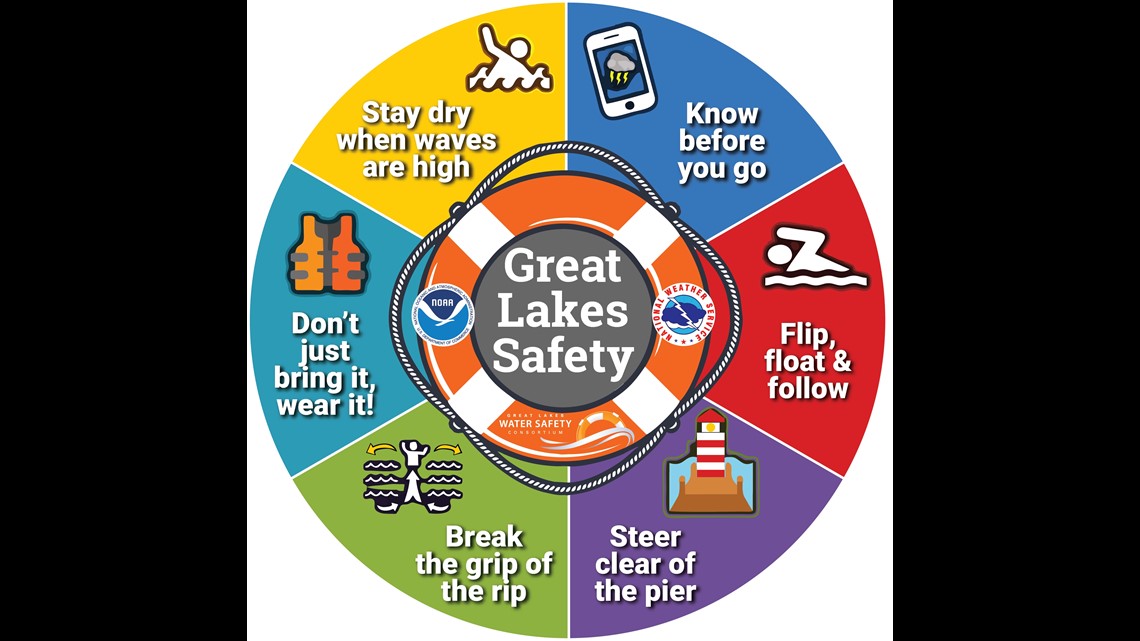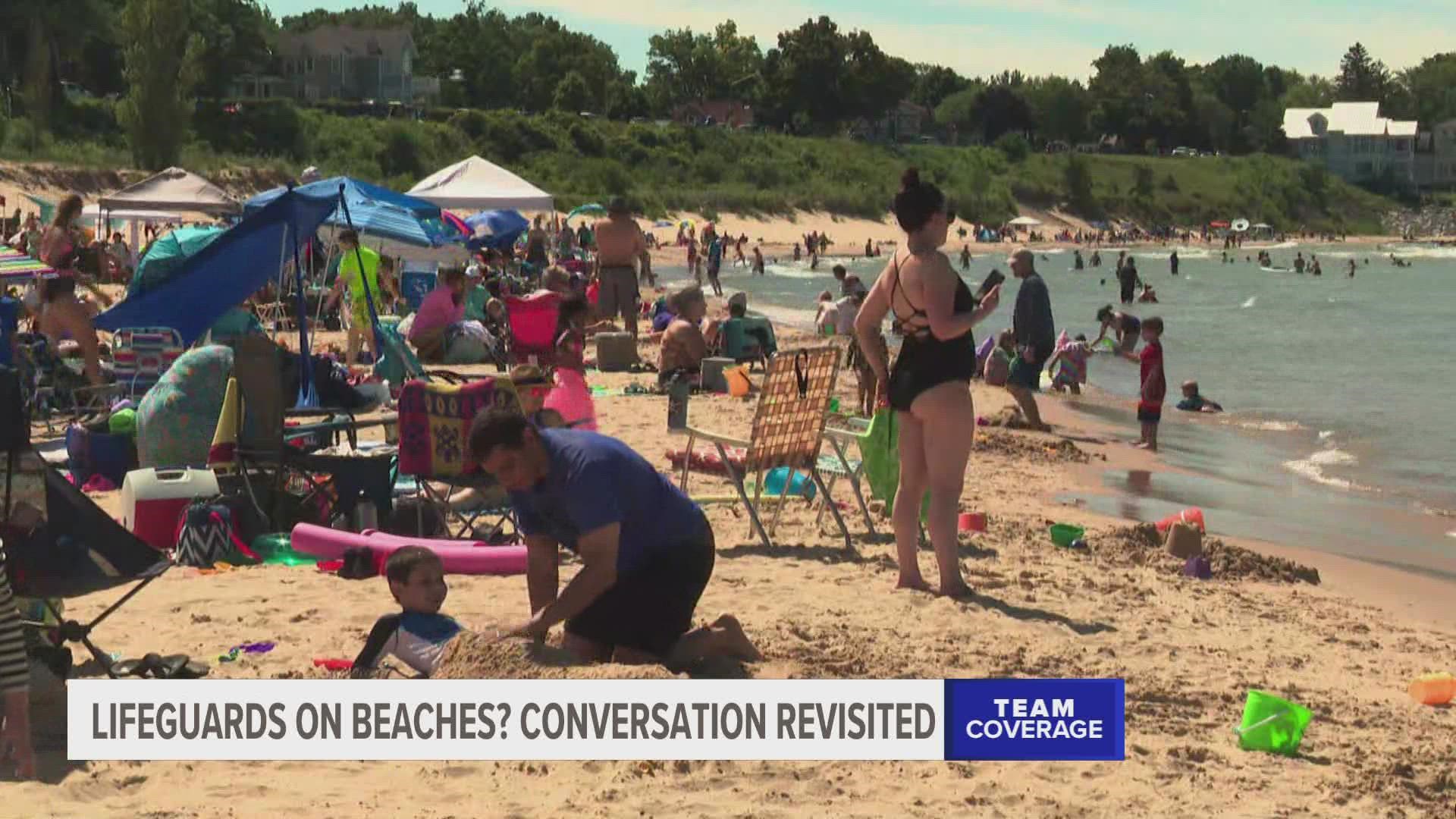LANSING, Mich. — The conversation surrounding adding lifeguards to Lake Michigan beaches has remerged in light of recent tragedies. This week, three people drowned in the Lake Michigan in a 24 hour period: one at Grand Haven State Park on Sunday, and two at South Haven beach on Monday.
There are not many beaches along Lake Michigan that have lifeguards. However, many safety advocates call them the gold standard of safety.
"The safest beaches are the ones with lifeguards," said Jamie Racklyeft, executive director of the Great Lakes Water Safety Consortium, "Unfortunately, there aren't very many."
The Consortium is a group working to prevent drownings in the Great Lakes in all states surrounding the water, even Ontario.
At the state level, the Michigan Department of Natural Resources (DNR) is not considering adding lifeguards to state park beaches.
There was a lifeguard program at state parks previously, which ended in the 1990s.
"For the park system, state parks beaches, that ended before my time in 1993," said Ron Olson, the Chief of Parks and Recreation for the Michigan DNR, "And the reason was because of liability concerns. Because when you have lifeguards, there's an implied supervision piece and things like that. The decision was made at that time to not to continue lifeguards, and then the evolution of the flag system has occurred, and the educational part of it."
It is worth noting the DNR would only have control to add lifeguards to state parks. There are many other city-owned beaches along Lake Michigan that also do not have lifeguards.
Olson said some of the challenges to implement lifeguards also comes down to funding and staffing. He said it has already been difficult this summer finding enough people to work for the parks system.
However, Racklyeft thinks all beaches along Lake Michigan, no matter which entity owns it, could do more to keep people safe. Lifeguards are part of that.
"Try to get your community to invest in lifeguards," said Racklyeft, "There's training available through Great Lakes Surf Rescue Project and other groups, the Red Cross. It's doable. It's just a matter of prioritizing safety over other things. So, there's there's the budget pie. Just put the safety, make that slice of the pie, a little bit bigger. And it's a really good investment."
The DNR has improved other safety measures on beaches in the past few years. Most recently, they now have the ability to close access to the water on days with dangerous conditions and issue fines for those who violate their warnings.
"That's been working well," said Olson, "I think Grand Haven has been closed five or six times, and we haven't written any tickets. People have paid attention and being in compliance, and it seems to be working."
He also said they have enhanced life-rings along beaches, and escalated their warnings. They also have made improvements to the education portion of safety, including signs at the entrance of parks, and posts every day on social media. Not to mention their the flag warning system, which has been in place for many years.
"In the end, people need to pay attention to their surroundings, taking responsibility for their actions and being mindful of things," said Olson, "And we don't want anybody to get hurt. One incident is too many."
13 ON YOUR SIDE reached out to Ottawa County lawmakers about what, if any, changes need to be done at a state level to keep people safe from drowning in Lake Michigan. Representative Bradley Slagh (R-Zeeland), said he believes people who live in West Michigan understand what the flag system means and its importance.
However, he believes there is some clarity needed for the DNR's ability to fine beach-goers. Specifically, he said it is unclear what "entering the water" means. He called the system "a struggle" because it does not truly defined what someone can be ticketed for.
As far as lifeguards, he believes they may encourage people to be even more reckless in the water, believing there is a safety net of the guard on standby.
"We just are not going to be able to legislate more and get different results than we're getting at the moment," said Slagh, "I don't think that's going to be a possibility. That doesn't mean that we stop trying to help people, and make sure that we've got systems in place to try and keep people like flags, to try and keep people out of water."


The Great Lakes Water Safety Consortium advocates for safety measures along the Great Lakes. Racklyeft said the top recommendation is adding lifeguards. However, they also say the next best thing is rescue equipment like life rings. Other programs like loaner life jackets along beaches and warning signs are also useful.
"If they're maintained throughout the day, they're effective," said Racklyeft, "If they're placed well, so people notice them, they can be effective. They're a useful tool to warn people of potential danger."
However, Racklyeft did call out the argument of liability when talking about adding lifeguards.
"We've had attorneys general across the Great Lakes look at this to see if legislation is needed to help protect communities," said Racklyeft, "And they said really it's already in place. So, it's really a myth of liability. It's an excuse, and it's not a good one."
He also suggested a water safety summit of some type, with governors and other leaders of Great Lakes states.
"Really have a serious talk about investing in lifeguards and other beach safety equipment and features," said Racklyft, "Because how many is it going to take? How many? How many drownings is it going to take before we take action and we actually take this seriously and do some things to prevent them in the first place."
RELATED VIDEO: 'There's no price on life': Recent drownings spark debate on lifeguards on Lake Michigan beaches
►Make it easy to keep up to date with more stories like this. Download the 13 ON YOUR SIDE app now.
Have a news tip? Email news@13onyourside.com, visit our Facebook page or Twitter. Subscribe to our YouTube channel.

